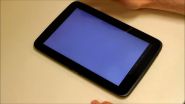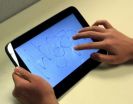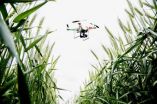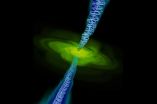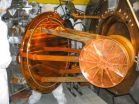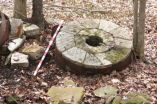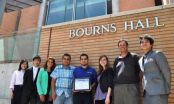(Press-News.org) VIDEO:
As more people use smart phones or tablets to pay bills, make purchases, store personal information and even control access to their houses, the need for robust password security has...
Click here for more information.
As more people use smart phones or tablets to pay bills, make purchases, store personal information and even control access to their houses, the need for robust password security has become more critical than ever.
A new Rutgers University study shows that free-form gestures – sweeping fingers in shapes across the screen of a smart phone or tablet – can be used to unlock phones and grant access to apps. These gestures are less likely than traditional typed passwords or newer "connect-the-dots" grid exercises to be observed and reproduced by "shoulder surfers" who spy on users to gain unauthorized access.
"All it takes to steal a password is a quick eye," said Janne Lindqvist, one of the leaders of the project and an assistant professor in the School of Engineering's Department of Electrical and Computer Engineering. "With all the personal and transactional information we have on our phones today, improved mobile security is becoming increasingly critical."
Lindqvist believes this is the first study to explore free-form gestures as passwords. The researchers will publish their findings in June as part of the proceedings of MobiSys '14, a premier international conference in mobile computing.
In developing a secure solution to this problem, Lindqvist and the other researchers from Rutgers and collaborators from Max-Planck Institute for Informatics, including Antti Oulasvirta, and University of Helsinki studied the practicality of using free-form gestures for access authentication. With the ability to create any shape in any size and location on the screen, the gestures had an inherent appeal as passwords. Since users create them without following a template, the researchers predicted these gestures would allow for greater complexity than grid-based gestures offer.
"You can create any shape, using any number of fingers, and in any size or location on the screen," Lindqvist said. "We saw that this security protection option was clearly missing in the scientific literature and also in practice, so we decided to test its potential."
To do so, the researchers applied a generate-test-retest paradigm where 63 participants were asked to create a gesture, recall it, and recall it again 10 days later. The gestures were captured on a recognizer system designed by the team. Using this data, the authors tested the memorability of free-form gestures and invented a novel method to measure the complexity and accuracy of each gesture using information theory. Their analysis demonstrated results favorable to user-generated, free-form gestures as passwords.
To put their analysis to practice, the Rutgers researchers then had seven computer science and engineering students, each with considerable experience with touchscreens, attempt to steal a free-form gesture password by shoulder surfing. None of the participants were able to replicate the gestures with enough accuracy, so while testing is in its preliminary stages, the gestures appear extremely powerful against attacks. While widespread adaptation of this technology is not yet clear, the research team plans to continue to analyze the security and management of free-form passwords in the future.
INFORMATION:
Are squiggly lines the future of password security?
Rutgers engineering researchers explore the security and memorability of free-form gestures as passwords
2014-06-04
ELSE PRESS RELEASES FROM THIS DATE:
Disinfection caps successful in CLABSI prevention
2014-06-04
Thanks to the simple use of an alcohol-impregnated cap, Loyola University Medical Center achieved a 68 percent decrease in the overall number of central line-associated bloodstream infections (CLABSI) over a 12-month period. A two-year study compared the use of disinfection caps to an intense scrub-the-hub intervention to standard care. Scrub-the-hub refers to cleaning catheter connector hubs and injection ports with alcohol for the recommended 15 seconds before accessing the central line, a catheter placed in a large vein to deliver medicine and liquids during hospitalization. ...
Genetics provide blueprint for new heart disease therapies
2014-06-04
PHILADELPHIA — Advances in the understanding of the genetics of coronary artery disease, or CAD, will revitalize the field and lead to more therapeutic targets for new medicines to combat this common disease, suggests a genetics expert from the Perelman School of Medicine at the University of Pennsylvania in a Perspective article in the new issue of Science Translational Medicine.
Daniel J. Rader, MD, chair of the Department of Genetics and associate director of the Institute for Translational Medicine and Therapeutics, asserts that the lagging search for new heart medicines ...
UCLA researchers identify new gene involved in Parkinson's disease
2014-06-04
A team of UCLA researchers has identified a new gene involved in Parkinson's disease, a finding that may one day provide a target for a new drug to prevent and potentially even cure the debilitating neurological disorder.
Parkinson's disease is the second most common neurodegenerative disorder after Alzheimer's disease, and there is no cure for the progressive and devastating illness. About 60,000 Americans are diagnosed with Parkinson's disease each year. It is estimated that as many as 1 million Americans live with Parkinson's disease, which is more than the number ...
Drones give farmers an eye in the sky to check on crop progress
2014-06-04
CHAMPAIGN, Ill. — This growing season, crop researchers at the University of Illinois are experimenting with the use of drones – unmanned aerial vehicles – on the university's South Farms.
Dennis Bowman, a crop sciences educator with U. of I. Extension, is using two drones to take aerial pictures of crops growing in research plots on the farms. He presented his findings to farmers and other researchers at the 2014 Ford / Iroquois County Agronomy Day meeting.
Bowman intentionally made mistakes on one test plot – "areas where we didn't apply enough nitrogen fertilizer, ...
Increase in number of total knee replacement surgeries, especially in younger adults, linked to obesity
2014-06-04
ROSEMONT, Ill.─The number of total knee replacement (TKR) surgeries more than tripled between 1993 and 2009, while the number of total hip replacements (THR) doubled during the same time period. A study appearing in the June Journal of Bone and Joint Surgery (JBJS) found that an increase in the prevalence of ovrweight and obesity in the U.S. accounted for 95 percent of the higher demand for knee replacements, with younger patients affected to a greater degree.
"We observed that growth of knee replacement volumes was far outpacing that of hip replacements and were ...
Surprisingly strong magnetic fields challenge black holes' pull
2014-06-04
A new study of supermassive black holes at the centers of galaxies has found magnetic fields play an impressive role in the systems' dynamics. In fact, in dozens of black holes surveyed, the magnetic field strength matched the force produced by the black holes' powerful gravitational pull, says a team of scientists from the U.S. Department of Energy's Lawrence Berkeley National Laboratory (Berkeley Lab) and Max Planck Institute for Radio Astronomy (MPIfR) in Bonn, Germany. The findings are published in this week's issue of Nature.
"This paper for the first time systematically ...
No evidence of the double nature of neutrinos
2014-06-04
Neutrinos are tiny, neutral elementary particles that, contrary to the standard model of physics, have been proven to have mass. One possible explanation for this mass could be that neutrinos are their own antiparticles, so-called Majorana particles.
Though experimental evidence for this is still lacking, many theoretical extensions of the standard model of physics predict the Majorana nature of neutrinos. If this hypothesis proves to be true, many previously unanswered questions about the origin of our universe and the origin of matter could be answered.
650 meters ...
NASA sees Depression Boris mOVING over Mexico with heavy rainfall
2014-06-04
Tropical Depression 2E strengthened into Tropical Storm Boris briefly on June 3 before making landfall in southern Mexico and weakening into a depression. While Boris was building to tropical storm strength, NASA's Aqua and TRMM satellites passed overhead identifying heavy rainfall and the extent of the storm.
On June 3 at 19:15 UTC (3:15 p.m. EDT) the Moderate Resolution Imaging Spectroradiometer (MODIS) instrument aboard NASA's Aqua satellite captured a visible image of Tropical Storm Boris over Central America. Boris appeared circular in the imagery and its clouds ...
Scientist uses fossils to prove historic Ohio millstones have French origins
2014-06-04
Cleveland . . . A geologist studied fossils to confirm that stones used in 19th century Ohio grain mills originated from France. Fossils embedded in these millstones were analyzed to determine that stones known as French buhr were imported from regions near Paris, France, to Ohio in the United States.
Dr. Joseph Hannibal, curator of invertebrate paleontology at The Cleveland Museum of Natural History, was lead author on research published in the Society for Sedimentary Geology journal PALAIOS.
The study documents a technique that uses fossils to definitively distinguish ...
Cleaning the air with roof tiles
2014-06-04
RIVERSIDE, Calif. (http://www.ucr.edu) — A team of University of California, Riverside's Bourns College of Engineering students created a roof tile coating that when applied to an average-sized residential roof breaks down the same amount of smog-causing nitrogen oxides per year as a car driven 11,000 miles.
They calculated 21 tons of nitrogen oxides would be eliminated daily if tiles on one million roofs were coated with their titanium dioxide mixture. They also calculated it would cost only about $5 for enough titanium dioxide to coat an average-sized residential roof.
That ...
LAST 30 PRESS RELEASES:
Scientists reveal our best- and worst-case scenarios for a warming Antarctica
Cleaner fish show intelligence typical of mammals
AABNet and partners launch landmark guide on the conservation of African livestock genetic resources and sustainable breeding strategies
Produce hydrogen and oxygen simultaneously from a single atom! Achieve carbon neutrality with an 'All-in-one' single-atom water electrolysis catalyst
Sleep loss linked to higher atrial fibrillation risk in working-age adults
Visible light-driven deracemization of α-aryl ketones synergistically catalyzed by thiophenols and chiral phosphoric acid
Most AI bots lack basic safety disclosures, study finds
How competitive gaming on discord fosters social connections
CU Anschutz School of Medicine receives best ranking in NIH funding in 20 years
Mayo Clinic opens patient information office in Cayman Islands
Phonon lasers unlock ultrabroadband acoustic frequency combs
Babies with an increased likelihood of autism may struggle to settle into deep, restorative sleep, according to a new study from the University of East Anglia.
National Reactor Innovation Center opens Molten Salt Thermophysical Examination Capability at INL
International Progressive MS Alliance awards €6.9 million to three studies researching therapies to address common symptoms of progressive MS
Can your soil’s color predict its health?
Biochar nanomaterials could transform medicine, energy, and climate solutions
Turning waste into power: scientists convert discarded phone batteries and industrial lignin into high-performance sodium battery materials
PhD student maps mysterious upper atmosphere of Uranus for the first time
Idaho National Laboratory to accelerate nuclear energy deployment with NVIDIA AI through the Genesis Mission
Blood test could help guide treatment decisions in germ cell tumors
New ‘scimitar-crested’ Spinosaurus species discovered in the central Sahara
“Cyborg” pancreatic organoids can monitor the maturation of islet cells
Technique to extract concepts from AI models can help steer and monitor model outputs
Study clarifies the cancer genome in domestic cats
Crested Spinosaurus fossil was aquatic, but lived 1,000 kilometers from the Tethys Sea
MULTI-evolve: Rapid evolution of complex multi-mutant proteins
A new method to steer AI output uncovers vulnerabilities and potential improvements
Why some objects in space look like snowmen
Flickering glacial climate may have shaped early human evolution
First AHA/ACC acute pulmonary embolism guideline: prompt diagnosis and treatment are key
[Press-News.org] Are squiggly lines the future of password security?Rutgers engineering researchers explore the security and memorability of free-form gestures as passwords
